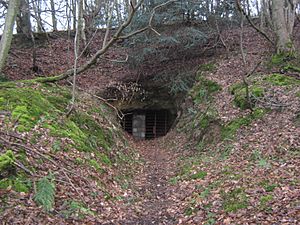Westerham Mines facts for kids
| Site of Special Scientific Interest | |
 |
|
| Area of Search | Kent |
|---|---|
| Interest | Biological |
| Area | 25.4 hectares (63 acres) |
| Notification | 1986 |
| Location map | Magic Map |
Westerham Mines is a special natural area in Kent, England. It is located south of the town of Westerham. This site is known as a Site of Special Scientific Interest (SSSI) because it is very important for wildlife, especially bats. It covers about 25.4 hectares, which is like 35 football fields!
Contents
What Makes Westerham Mines Special?
Westerham Mines became a protected area in 1986. It is a "biological" SSSI, meaning it's important for living things. The main reason it's so special is because old mines here are used by many bats. These bats use the mines as a safe place to sleep through the winter.
A Cozy Home for Bats
The old mines at Westerham are perfect for bats to hibernate. Hibernation is like a deep sleep that some animals do in winter. It helps them save energy when food is hard to find. Mines are good because they stay cool and steady in temperature. They are also dark and quiet, which bats love.
Bat Species You Might Find
Five different kinds of bats use Westerham Mines for hibernation. These include:
- Whiskered Bat: A small bat with long, shaggy fur.
- Brandt's Bat: Very similar to the whiskered bat, often hard to tell apart!
- Daubenton's Bat: Also called the "water bat" because it often hunts insects over water.
- Natterer's Bat: Known for its very long hairs on the edge of its tail membrane.
- Long-eared Bat: These bats have very big ears, which help them hear tiny sounds.
Besides bats, some types of moths also spend their winter sleeping in these mines.
Visiting Westerham Mines
You can visit the area around Westerham Mines. It's a great place to explore nature. However, you cannot go inside the mines themselves. The entrances are sealed off with special grilles. These grilles keep people out but let the bats fly in and out freely. This helps to protect the bats and their important hibernation spots.

